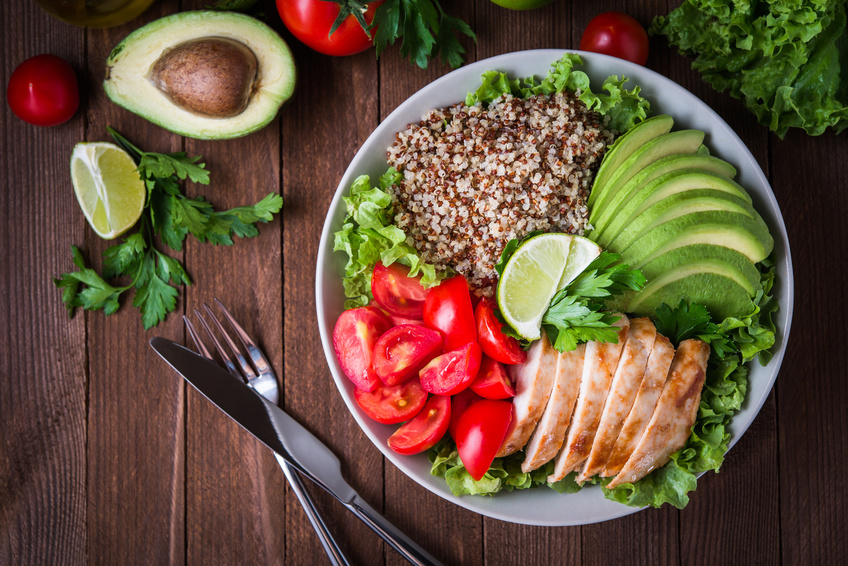DUTCH testing and oestrogen metabolism
April 18, 2020Sustainable eating for Earth Day and beyond
April 24, 2020Stress free meal planning
 Getting organised in the kitchen has become increasingly important in recent weeks. The movement restrictions related to COVID 19 makes meal planning the ‘stress less’ option. The luxury of picking up some last-minute bits for dinner is just not possible right now. While online shopping deliveries have restricted time slots, requiring us to think ahead. For many people, a lack of planning and organisation is a real stumbling block to making healthier meal choices. Setting aside some time to create a meal plan and a shopping list for the week ahead can take the hassle out of healthy eating and help to keep your family’s wellbeing on track.
Getting organised in the kitchen has become increasingly important in recent weeks. The movement restrictions related to COVID 19 makes meal planning the ‘stress less’ option. The luxury of picking up some last-minute bits for dinner is just not possible right now. While online shopping deliveries have restricted time slots, requiring us to think ahead. For many people, a lack of planning and organisation is a real stumbling block to making healthier meal choices. Setting aside some time to create a meal plan and a shopping list for the week ahead can take the hassle out of healthy eating and help to keep your family’s wellbeing on track.
Meal planning can eliminate waste
There are a great many benefits to meal planning. It reduces the stress of scrambling around for last-minute dinner ideas. Often working to a plan is more cost-effective and eliminates the waste associated with throwing out unused perishables. If you are wasting food, you are losing money. What’s more, in these days of travel restrictions, you may simply not have the right foods at home or to hand when hungry. The truth is, it is much easier to stray and eat unhealthy foods when disorganised and out of routine.
Develop the habit
The thought of planning your week’s meals may sound daunting at first. Once you become familiar with some fundamental principles, it really isn’t that scary. It saves time, money and stress. To help you get started, we have put together some tips to help you get properly organised. Before too long, you may find it is a natural habit to develop. Giving you one less thing to worry about in these extraordinary times.
To begin meal planning, create a seven- day planner that you can quickly amend. It could be a Google doc, a spreadsheet, a magnetic fridge whiteboard or a simple notepad. One week is a reasonable timeframe in which to use fresh ingredients before they spoil. It is a good idea to mix it up using a variety of fresh, frozen and dry goods.
Things to consider before meal planning
- Food you have ‘in stock.’
- The time you have for food preparation
- What activities you have planned in your schedule
- Who else you are cooking for
- What you want to include – kids healthy favourites etc.
- How much money you want to spend
- What is in season
- What room you have in the freezer!
Start with dinners
Plan around your main meals and leftovers can easily be reinvented as easy lunches or supper. Include recipes that are suited to batch cooking. For example, a tray of roasted Mediterranean vegetables prepared at the start of the week can easily be reinvented into a soup, a delicious frittata or filling for a pitta with halloumi cheese.
As a start aim to plan 7 dinners and 4 lunches per week. This allows you to have some flexibility. It doesn’t need to be a rigid plan, knowing what you are planning to cook and having the ingredients to hand can be quite liberating.
Store cupboard essentials
The backbone of any successful meal plan is a well-stocked larder. We have created a store cupboard essential list to help you get started.
Healthy Targets
Across the seven days set yourself some healthy targets to ensure you are meeting your family’s nutritional needs.
- Have you included enough fruit and veg? Aim for 2 fruit and 5 veg daily
- A variety of whole grains?
- Plenty of fish? Aim to include 3-4 portions of oily fish such as Mackerel, Sardines and wild or organic salmon.
- A variety of other proteins?
- Pulses such as tinned beans, lentils and chickpeas.
- Lean meat such as chicken, turkey and lamb
- Nuts and seeds
- Aim to include one or two vegetarian meals, curries and chilli’s freeze well.
- Have you got some options for healthy snacks in the house?
- Are you eating the same foods every day, NB breakfasts and lunches? Remember eating a varied diet is vital to get a wide range of nutrients.
Put the plan into practice
Once you have penned your seven-day plan then write up your shopping list. Decide what can be purchased in your weekly shop and what can be delivered. Many local food producers are offering an online service. Schedule deliveries for different days of the week. Check out what is available to you locally. Some companies providing deliveries nationwide are:
- https://www.greenearthorganics.ie/
- https://eatmorefish.ie/
- https://www.thefriendlyfarmer.ie/
- https://www.thegoodoliveco.com/
Most importantly, put the plan somewhere visible in the kitchen. This will enable you to make notes as the week goes on. At the end of the week, review the week’s meal plan. What worked? What were the obstacles? Tweak it to suit your needs and family’s preferences and overtime you will perfect your plan.
If you would like to talk to us about your health needs, call us on 01 4020777 or book online now.


